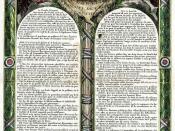World History Standard 10.2
Many of the principles of the Magna Carta, the English Bill of Rights, the American Declaration of Independence, the French Declaration of the Rights of Man and the Citizen, and the U.S. Bill of Rights helped shaped other countries views.
The Magna Carta greatly influenced future governments. The Magna Carta contained 63 important clauses. Two of them established rights for individuals. Clause 12 proclaimed that the king could not demand taxes but rather had to ask for some type of formal and common agreement Clause 39 declared that a person had a person had the right to a jury trial and to the protection of the law. This right became known as due process of law. Another clause was that the king could not levy taxes without the Parliament's consent. Clause 39 announced that the government could not arrest people without for suspicion.
Thanks to William and Mary, England finally had its Bill of Rights in 1689.
A bill of rights contained a formal summary of the rights and liberties considered essential to the people. The English Bill of Rights limited the power of the monarchy and protected free speech in the Parliament. The rulers were prohibited from suspending laws, to tax w/out the consent of Parliament, or from raising an army during peacetime w/out Parliament's consent.
The American Declaration of Independence was issued on July 4, 1776. In it they justified why they should be a free country. Many of the Enlightenment thinkers, especially Locke, influenced the makers of the Declaration.
The French adopted the Declaration of the Rights of Man and of the Citizen. It guaranteed the rights of the people such as "liberty, property, security and resistance to oppression". It turned France into a limited monarchy and reorganized the Catholic Church...


